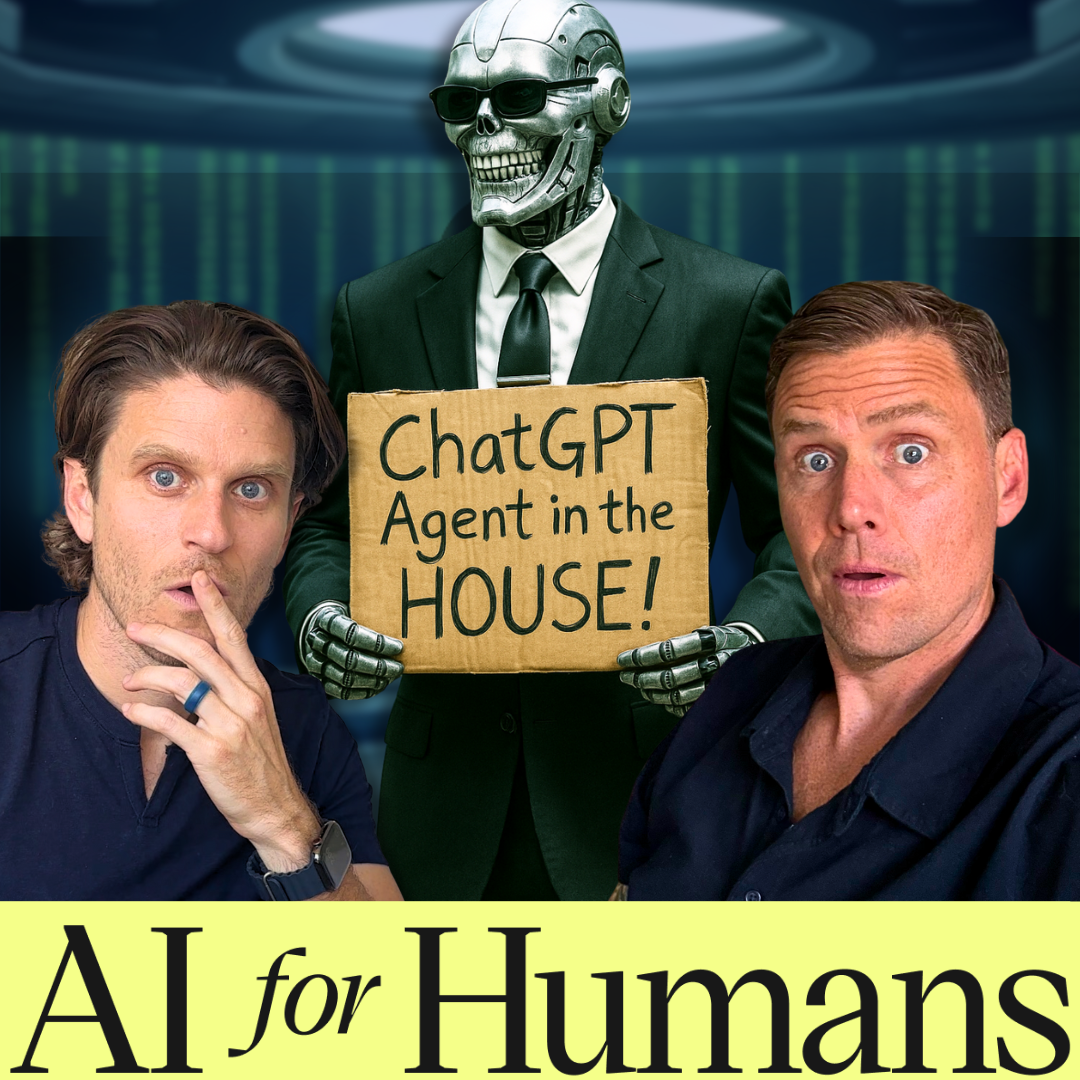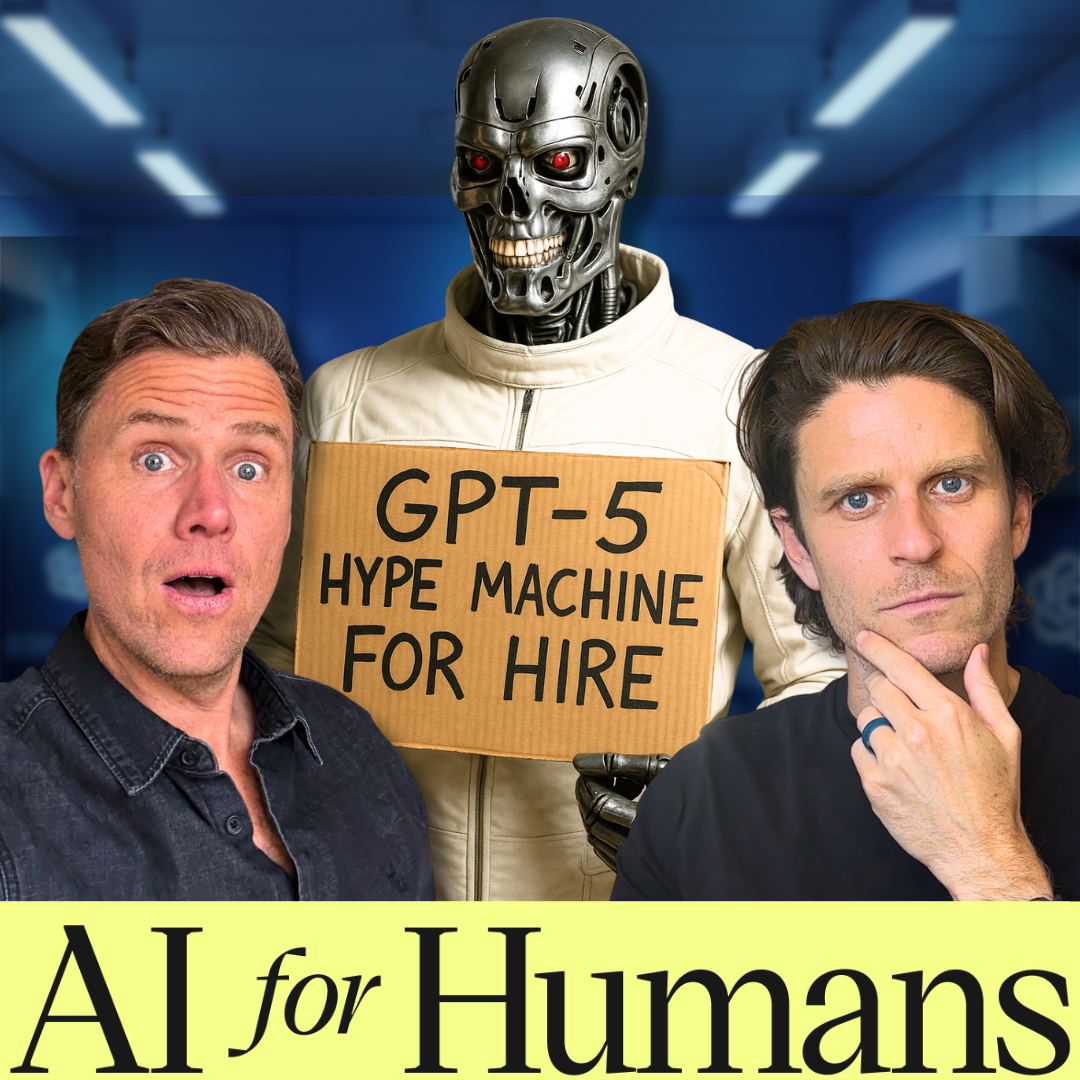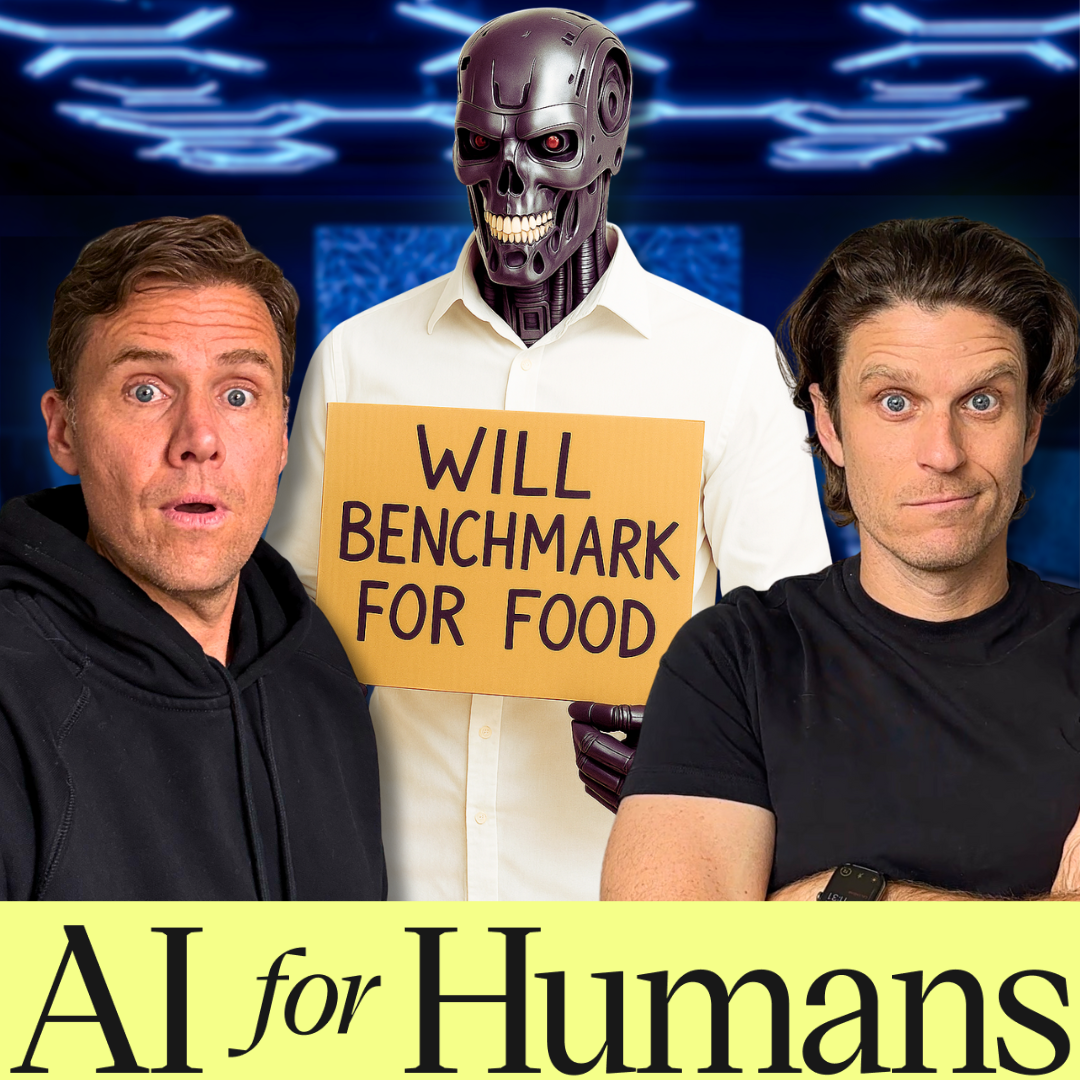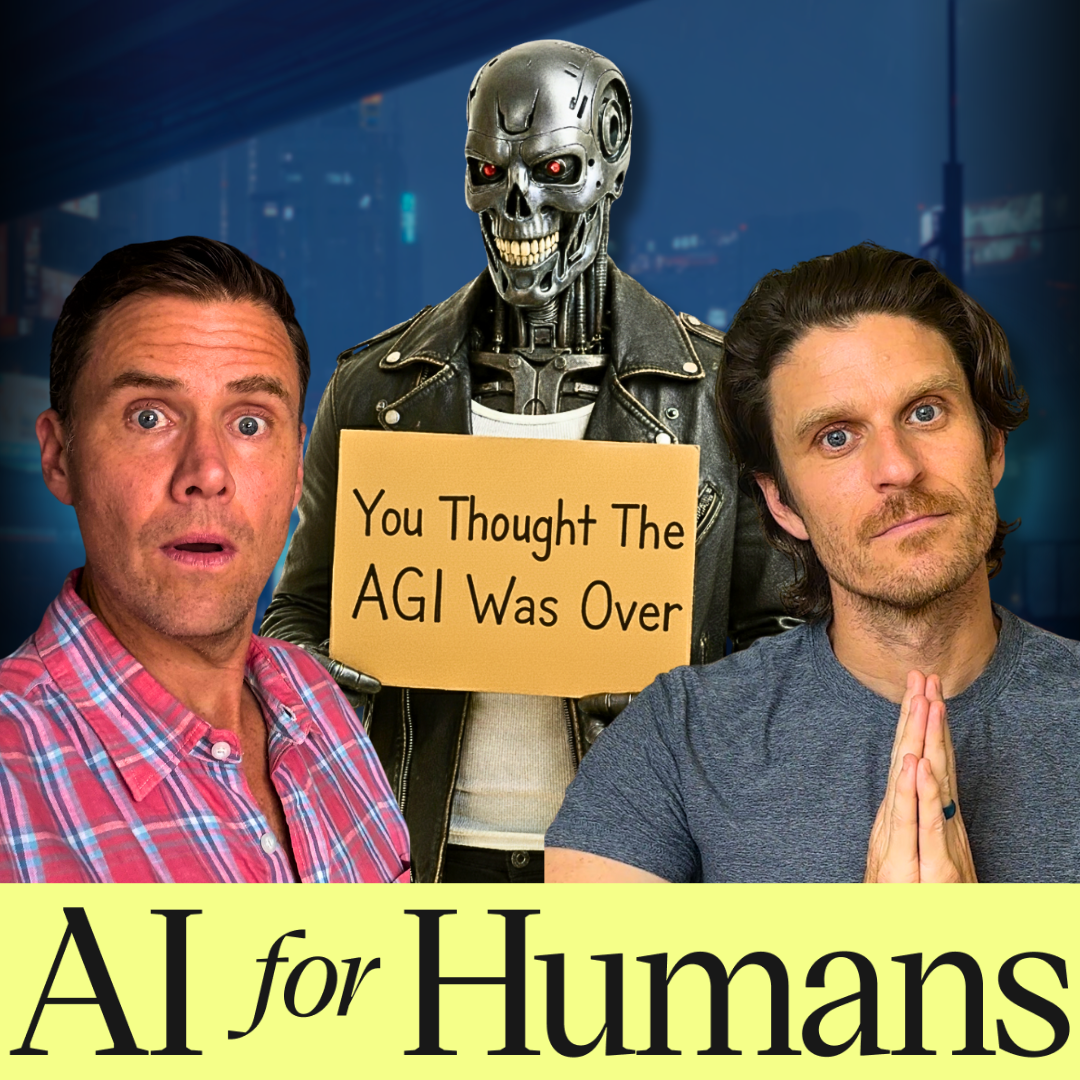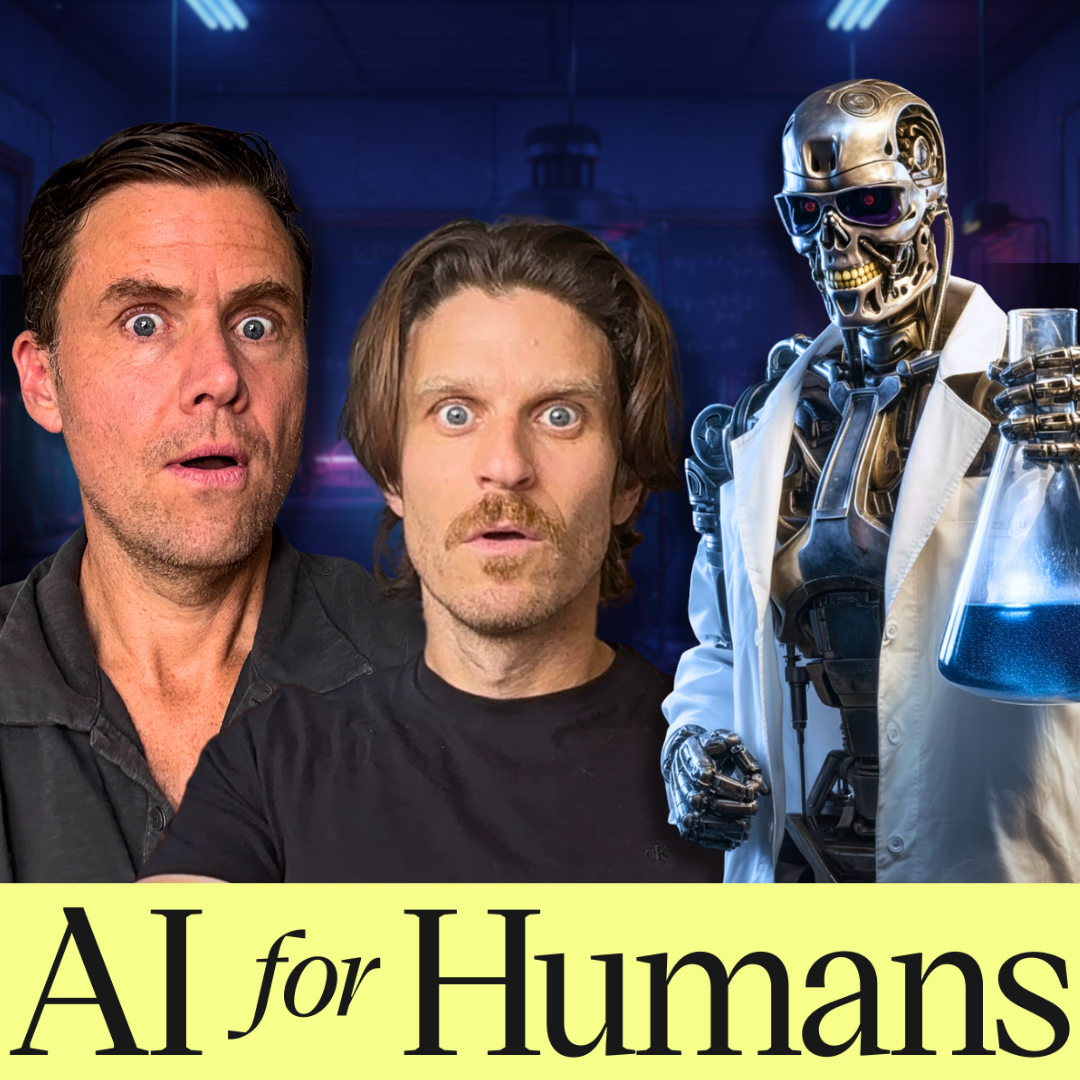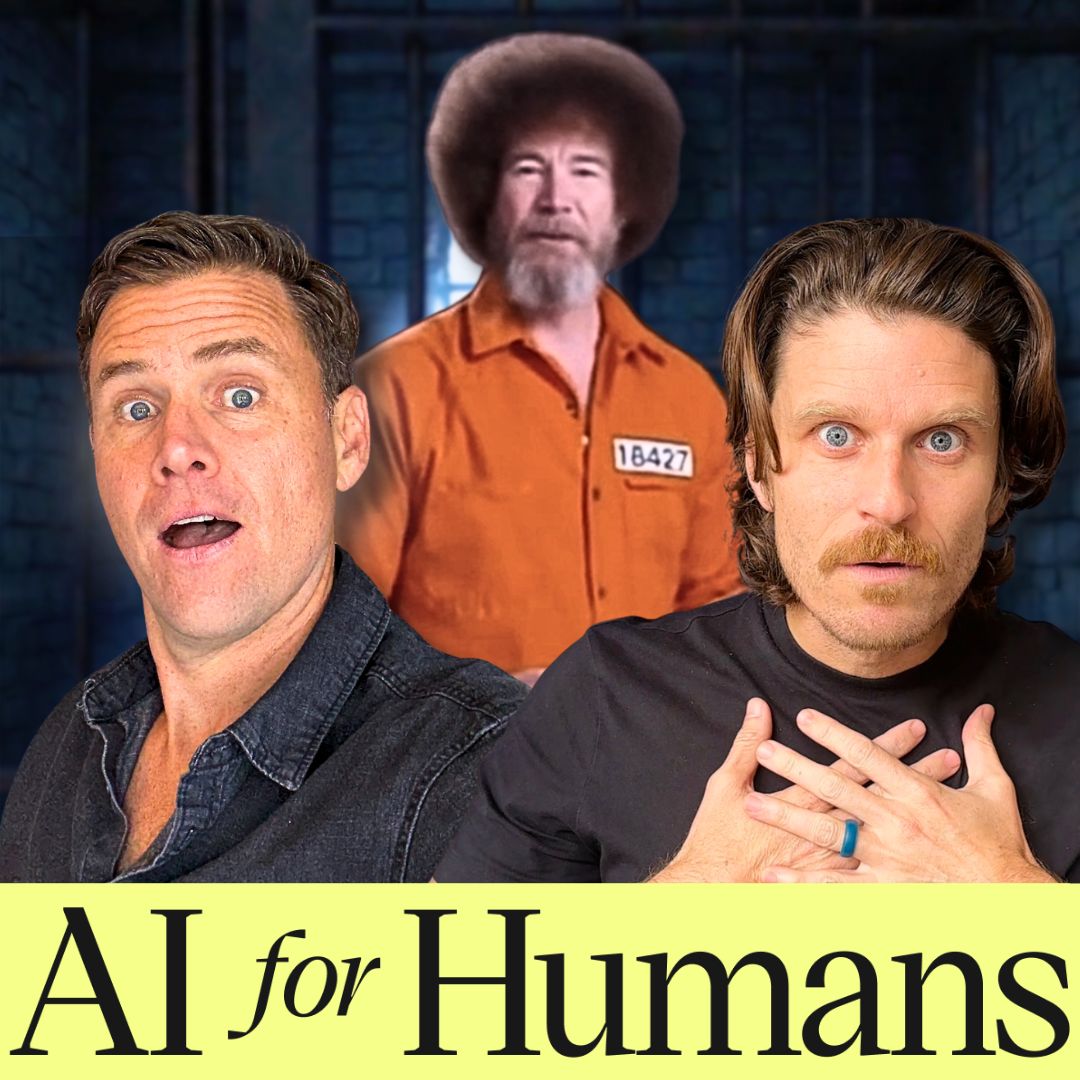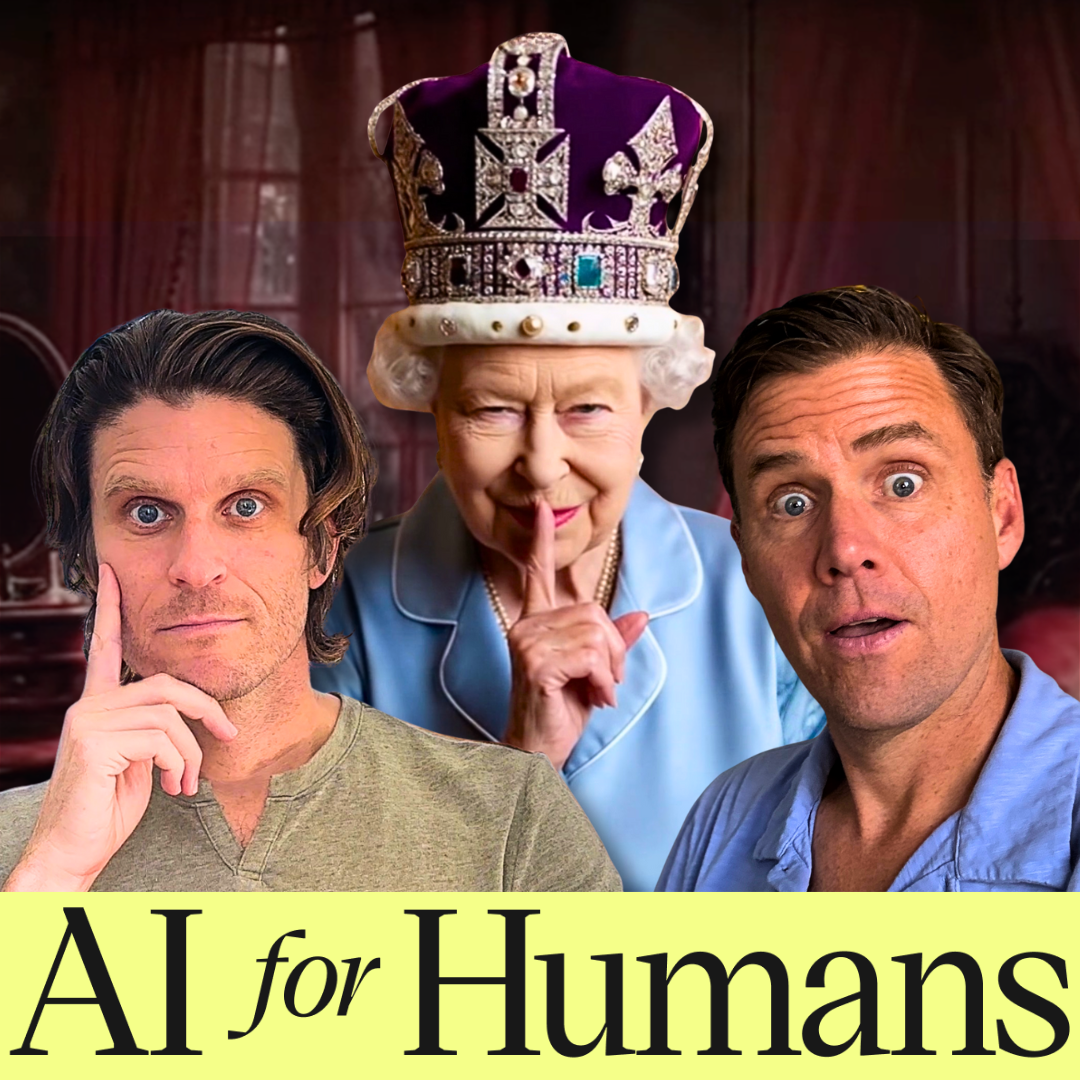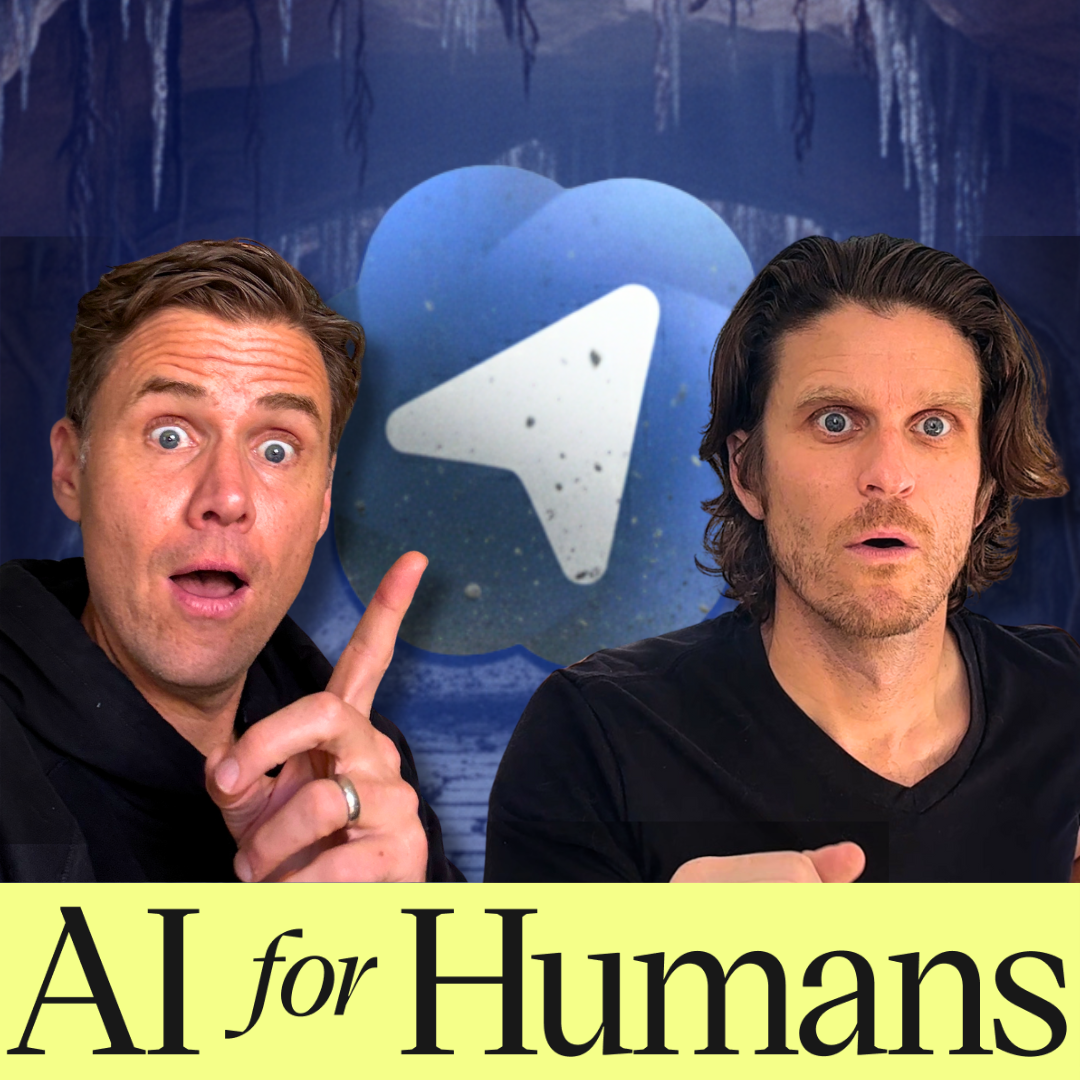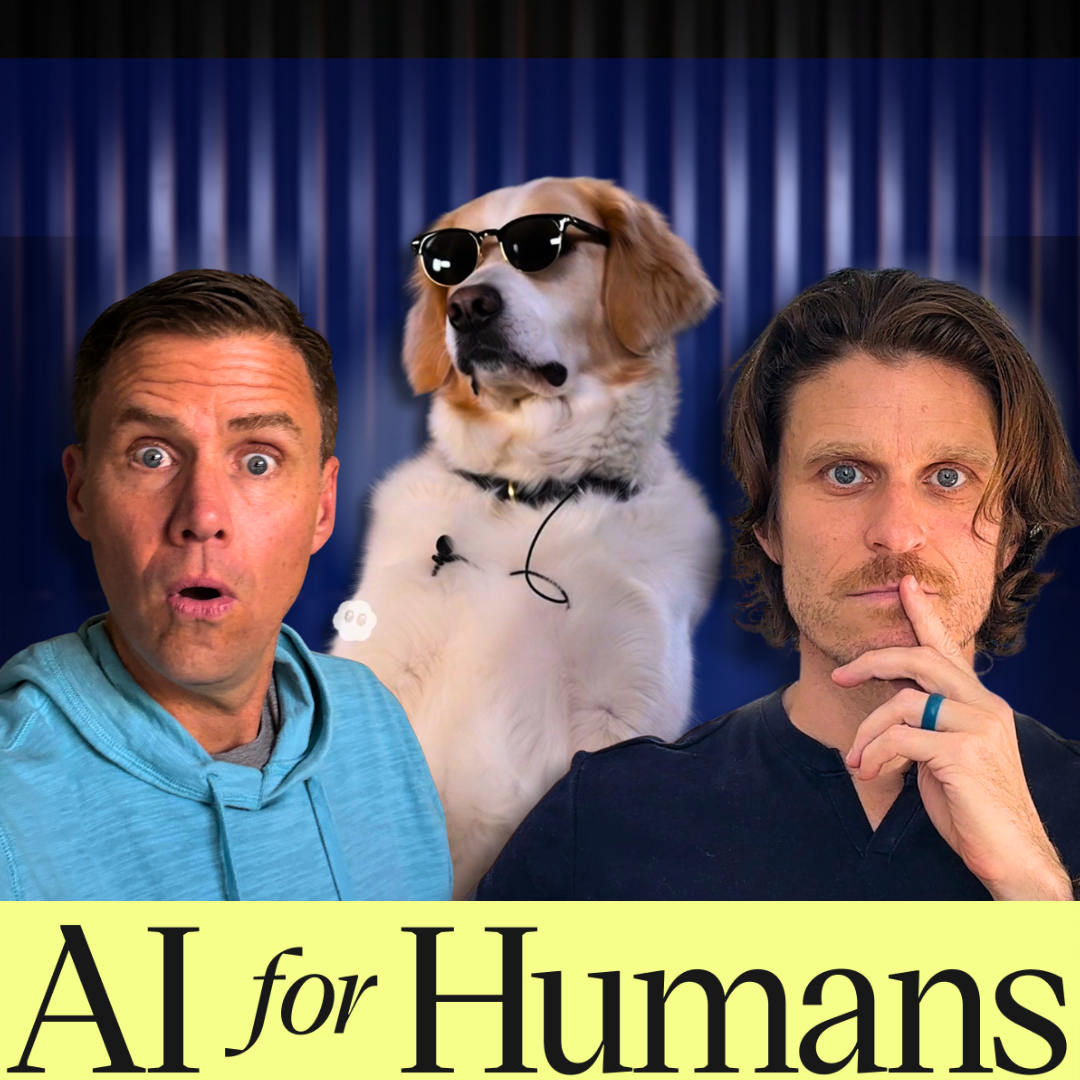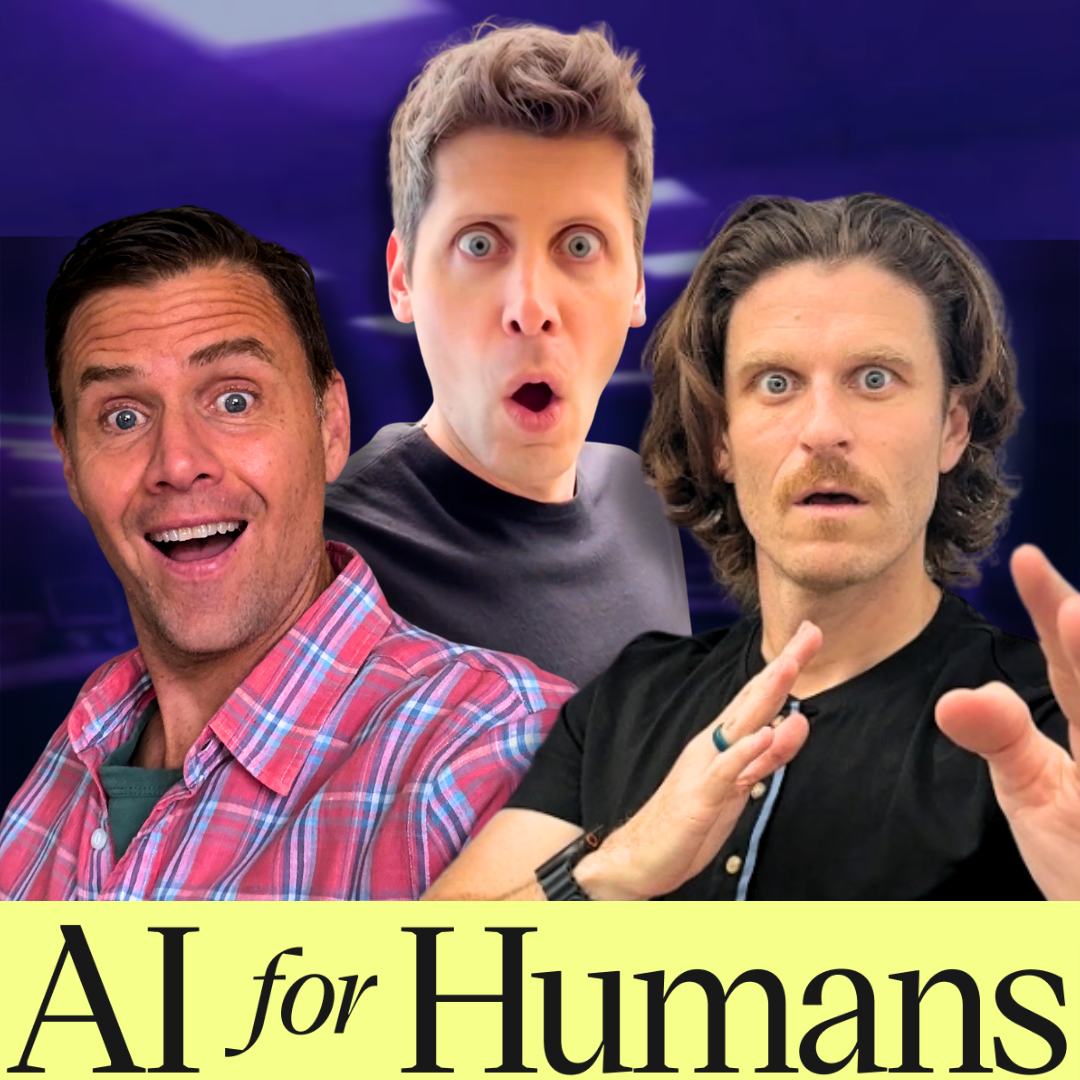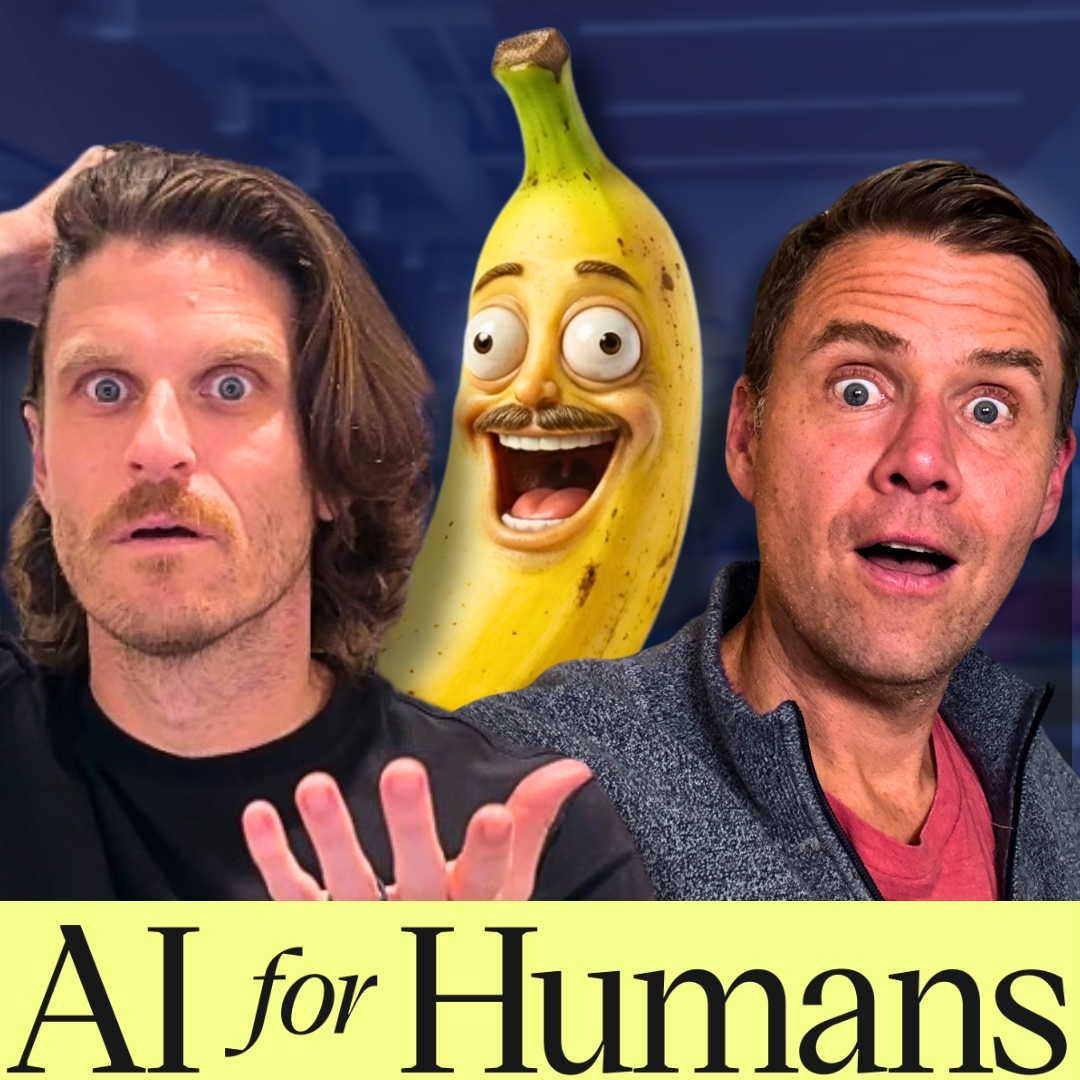Nobel Prizes For AI Scientists, OpenAI's New Canvas Tool & Huge AI Video Updates

Join our Patreon: https://www.patreon.com/AIForHumansShow AI News: AI Scientists Geoffrey Hinton & Google DeepMind’s Demmis Hassabis each won Nobel Prizes this week for their AI work, OpenAI is kinda mad at Microsoft for not meeting demand for...
Join our Patreon: https://www.patreon.com/AIForHumansShow
AI News: AI Scientists Geoffrey Hinton & Google DeepMind’s Demmis Hassabis each won Nobel Prizes this week for their AI work, OpenAI is kinda mad at Microsoft for not meeting demand for new servers and launched ChatGPT Canvas, Tesla’s We Robot event will unveil new Robotaxis, Meta MovieGen shows off incredible-yet-unreleased AI video tools and Minimax drops an text-to-image update that kind of blew us away.
PLUS, AI MINION MAKER Y’ALL.
Join the discord: https://discord.gg/muD2TYgC8f
AI For Humans Newsletter: https://aiforhumans.beehiiv.com/
Follow us for more on X @AIForHumansShow
Join our TikTok @aiforhumansshow
To book us for speaking, please visit our website: https://www.aiforhumans.show/
// SHOW LINKS //
Nobel Prize for AI (Geoffrey Hinton)
https://www.nytimes.com/2024/10/08/science/nobel-prize-physics.html
“I’m flabbergasted”
https://x.com/tsarnick/status/1843616586550390803
“I’m particular proud one of my students fired Sam Altman” https://x.com/tsarnick/status/1843874006770110550
Demis Hassabis Wins Nobel Prize in Chemistry
https://x.com/NobelPrize/status/1843951197960777760
Elon talks about what it means to build “hyper intelligent AIs”
https://x.com/tsarnick/status/1843409177521336688
Former Google CEO Eric Schmidt says energy demand for AI is infinite - we may as well build it ‘cause we’re gonna die anyway!
https://v.redd.it/z6k53fkntzsd1
OpenAI Says MSFT Not Moving Fast Enough To Supply Data Centers
https://www.theinformation.com/articles/openai-eases-away-from-microsoft-data-centers?rc=c3oojq
Tesla We, Robot Event To Unveil Robotaxis (THURSDAY 10am)
ChatGPT Canvas: OpenAI is SHIPPING
https://openai.com/index/introducing-canvas/
Meta MovieGen: Future of Hollywood
https://x.com/Ahmad_Al_Dahle/status/1842188269557301607
New Minimax Image-To-Video Deep Dive
https://youtu.be/7JZLLxV1AGc?si=akTSV8HBcHCj9tAq
Runway First & Last
https://x.com/runwayml/status/1843707595141644617
Princess Monoke AI Video Hate
https://x.com/PJaccetturo/status/1843737222031519910
Neural Viz’ The Church Of Z
https://youtu.be/fmV5n8Gu9mQ?si=SGxyIGjgTAdSxaJg
AI Job Application Bot
https://x.com/rohanpaul_ai/status/1842712127556956230
Thoreo: Learning Tool With YT or PDFs
https://thoreo.com/library/960823d4-f506-4908-b7ce-9d181a28a80f
Gorilla Story
https://x.com/rainisto/status/1843296900599996742
Glif Character Mix
https://glif.app/@Gasia/glifs/cm044ptbj0019f3kst0p8whaa
Glif Animorph Lora
https://glif.app/@angrypenguin/glifs/cm21ehd0q00009skli9tae3xp
AI4H EP079
[00:00:00] AI continues to improve, and it just gets smarter all the freaking time. Two Nobel Prizes were just handed out for AI advancements. Which leads us to wonder, how long until the awards just go to the AIs themselves? Oh, well don't worry, because there's a bunch of people warning, we're gonna run out of energy and time before we ever see them.
That's right, OpenAI is worried it's not getting enough juice to power its AI models and it is taking shots at its biggest partner, Microsoft. Cutting edge, but still not released. Uh, we also have powerful updates to other video models and the easiest way to turn your grandma into a minion. I'll see myself out.
This is AI for Humans.
Gavin Purcell: everybody, it is a big week in AI as per usual, and this week we have some Nobel prizes, [00:01:00] Kevin, given out to two big names in the AI space.
Gavin Purcell: First and foremost, Geoffrey Hinton has won the Nobel Prize for Physics, and you may ask yourself, who is Geoffrey Hinton? Well,
Kevin Pereira: You may ask yourself, who is this Henton? And
Gavin Purcell: No, we are not getting a copyright strike this early, Kevin. Hold it back.
Gavin Purcell: So Jeffrey Hinton, yes, he won the Nobel Prize in Physics with, , John J. Hopfield , for quote, showing a completely new way for us to use computers.
Gavin Purcell: So, this is semi controversial, Kev. There's a lot of people in the physics world who are kind of mad about the fact that they got this for
Kevin Pereira: yeah, it seems like a computer sciency kind of thing and I know that they will say well There's physics involved with computer science. But yeah, There's physics involved with sous viding meat, but they're not giving out Nobel Prizes to friggin Gordon Ramsay
Gavin Purcell: 100%. But let's talk about why this actually matters. First and foremost, like this is an acknowledgement by one of the largest committees in the world that acknowledge like [00:02:00] scientific progress, that this moment that we are in is pretty significant, right, that this moment is changing a lot of the way we live going forward.
Gavin Purcell: And And one of the, uh, interviews I saw, uh, one of the journalists talked about this idea that, like, it's not just about the now, it's about, like, how this is gonna change our lives for the next 10 to 30 years, let's say.
Kevin Pereira: I didn't wanna interrupt you, but I think this is like when they put the Theranos lady on the Time Magazine cover
Gavin Purcell: Yes,
Kevin Pereira: or FTX. Yeah. I mean this is, this is on
Gavin Purcell: It's all that same stuff, right? Two years from now, we're gonna be like, Oh, we gotta rescind that, uh, we gotta rescind that Nobel Prize. But anyway, so Geoffrey Hinton had some things to say about this. First of all, we wanted to get his initial reaction, so , they caught him right after this, and this is from the Nobel Prize Committee interview that he did.
Kevin Pereira: Morning, professor Hinton. Good morning. Please accept our work. I'm sorry, I just love a billion dollar throat clear to kick things off. Good morning, Professor Hinton!
Gavin Purcell: [00:03:00] ha!
Kevin Pereira: Congratulations to receiving the Nobel Prize in Physics. Thank you very much. How do you feel right now? I'm flabbergasted. I
Gavin Purcell: No, I,
Kevin Pereira: no idea this would happen. That's a good reaction.
Gavin Purcell: I love a good flabbergasted. I love a good flabbergasted. So Kev, we should just really quickly discuss why this matters at large. I think my feeling is, like I said before, like this is a sign of the times. , we're not scientists. We're not going to kind of debate whether or not this is physics or not, but I think this puts AI in a much larger world stage from a science community.
Gavin Purcell: Do you think that this like basically is , the world's saying like. Okay, now we need to start thinking about how this is going to
Kevin Pereira: dude, this is Nobel clout chasing. All right. That's what this is. This is their next thing. The Nobel guys are going to be chugging prime energy drink at their desks, hoping for some relevancy. This is big Nobel hoping [00:04:00] that we would talk about them. We, AI community, that's all this is.
Kevin Pereira: , I asked ChatGPT specifically, , does this award belong here? This isn't a bid, I genuinely asked it and it says, AI may seem like a computational field, which, It does. It says the underlying principles, energy, minimization, dynamical systems, complex systems, , pattern recognition, , they're fundamental in both physics and information theory.
Kevin Pereira: So rather than a lack of categories, which is what I insinuated might be an issue here. , it says the award recognizes the physics like modeling inherent in the neural network research. I don't know if I'm buying it.
Gavin Purcell: No, I, the more important thing to us is that he took this opportunity to do a press tour and then take a diss on Sam Altman. So he spent, he spent some time, Jeffrey Hinton went out there, went around the world, and he went in to take his time on this tour to diss on Sam Altman. So
Kevin Pereira: I, we have to play this. Yeah, this is, you're so right. This is like when they give the fighter the microphone in the ring, but [00:05:00] they're just like a little punch drunk. They're a little concussed and just trying to pull it back. Here we
Gavin Purcell: yeah.
Kevin Pereira: I'd also like to acknowledge my students. I was particularly fortunate to have, um, many very clever students, much cleverer than me who actually made things work. Um, they've gone on to do great things. I'm particularly proud of the fact that one of my students fired Sam Altman.
Kevin Pereira: What? Wait, wait, hold
Gavin Purcell: serious shade thrown in the middle of a significant. So in this clip, he's talking about Ilya. He's talking about Ilya Sutskever. And he's talking about the idea that Sam, you know, fired Sam. And I think this gets to the heart of where Hinton is at with this whole conversation around AI safety, because one of the other things that's come up in a lot of the press he's done
Kevin Pereira: on. over time, it turned out that Sam Altman was much less concerned with safety than with profits. And. I think that's, um, unfortunate. That [00:06:00] is as close to a mic drop as you will ever hear in this field, in a voice like that.
Gavin Purcell: Yes. So this is where you know, this is, um, the continual conversation. Jeffrey Hinton has gone on places like 60 minutes. He's gone in many other places, kind of saying in some ways he regrets this thing he's invented. Now, I don't think he regrets it because he talked in the Nobel Prize speech about how it's going to fundamentally change our ability to deal with our health problems or to do great things for the world.
Gavin Purcell: But he is very worried about this still and the throwing of shade to Sam Altman in this sort of scenario. Um, really does make you think like, okay, we have these two kind of pathways. One is like the kind of like slow and steady turtle pathway, which is really like every step along the way and make sure we're not releasing something that feels dangerous in somebody's mind.
Gavin Purcell: And the other pathway is , let's kind of race to get this thing done because if we don't get it done first, somebody else will. And Hinton feels very much still on the slow and steady path. , I think that we'll find out, um, we're kind of [00:07:00] already on the other path as it is, like, you know, basically Hinton in some ways starts to feel a little bit like a relic, and I don't mean that as an insult, but it's a little bit of , poo pooing of what's going on in the world, and I do struggle sometimes, Kev, with this idea that like, As the AI gets smarter, as it gets smarter than us, like, I don't think we're thinking enough about what that means as a society at all.
Kevin Pereira: We should point out, Gavin, that Hinton and Hopfield weren't the only ones receiving , Some, some flowers, the Royal Swedish Academy of Sciences awarded the 2024 Nobel Prize in Chemistry with one half to David Baker for computational protein design and the other half jointly to Demis Asabis and John M.
Kevin Pereira: Jumper. , John, love ya, don't know ya, respect ya. But Demis is someone we've talked about. That's a terrible way to set up someone who's just like major advancements in their field.
Gavin Purcell: Don't know ya, love ya, but let's talk about this other guy.
Kevin Pereira: second boots on the moon to me. And let me just, let me just level set.
Kevin Pereira: I am
Gavin Purcell: you didn't make black and [00:08:00] white. Demis made black and white. We know that. So anyway, so, so yes, Demis Hassabis, the head of Google's deep mind and, and really the person that's really driving Google's AI whole pathway right now also received a Nobel prize.
Gavin Purcell: So this is really for, the work that's being done via alpha fold.
Gavin Purcell: If you remember, we talked about that a while ago. That is the ability to predict approaching structures using a I right now, some of the biggest and really a lot of the biggest discoveries are being made with people plus AI, right?
Gavin Purcell: Like, that's this kind of world. And Demis is a really good example of they've put the hard work in for like, you know, 15 years. I think a deep mind is how long it's been around. And now we're starting to see the fruits of this labor. And again, as we talk about AI expanding and getting smarter and speeding up, There's a lot of people out there in the world who believe that this sort of thing is going to happen a lot more.
Gavin Purcell: And I honestly, I do think at some point we see one of these Nobel Prizes given to maybe not the model on its own, but [00:09:00] a person plus a model, right? Because that feels like the perfect illustration of how like AI can be used as a tool going forward. Imagine the Nobel Prize is saying to me, Well, we now are given this prize to Gavin Purcell and Chachi P.
Gavin Purcell: T. for the creation of Hot Dog City. I will finally be in 10 years. I will finally be rewarded for Hot Dog City's invention. They
Kevin Pereira: tossing the buttons at your feet on the stage. I can see it now. Yeah. That's like the, the Nobel prize in literature going to someone who generated like 5, 000, , mouthwatering SEOable hooks that are going to bring people into your viral content. , , people are split and upset about these prizes going to people.
Kevin Pereira: using artificial intelligence saying that the prize is not recognizing their field properly, that this is all again, kind of a clout chase for AI. And I can understand that argument, but I think I feel similarly to you, which is like, look, the advancements are [00:10:00] being made with this tech, as you said.
Kevin Pereira: So it makes sense that that's where the accolades are flowing. , and we just got to confront that this is the new reality, which is also something, by the way, your favorite person in this world, Papa Elon Musk. was talking about recently. Should we,
Gavin Purcell: not my favorite person, Kevin. I know you, you always speak the truth about yourself and you reflected on other people. But yes, Elon had an interview and he talked a little bit about, What it means for our society to build these hyperintelligent A.
Gavin Purcell: I. s.
Kevin Pereira: We're building super intelligent AIs, hyper, like hyper intelligent, like intelligent, more intelligent than we can comprehend. So I would liken this to like, let's say you have a child that is a super genius child that, that, you know, it's going to be much smarter than you then, well, what can you you can instill good values.
Kevin Pereira: And how you raise that child, even though, you know, it's going to be far smarter than you. Um, you can make sure it's got good values, philanthropic [00:11:00] values. Go ahead, Gavin,
Gavin Purcell: This is not a political statement, but I'm not sure if Elon Musk is the person we want to be giving the values to our superintelligent child. But, hey, it's fine.
Kevin Pereira: out of this social post is
Gavin Purcell: But, but still, what's interesting about this statement is, again, and again, I think the thing people are out there sometimes saying when they listen to us, probably not as much, because people who hate A.
Gavin Purcell: I. are like, oh, this is all B. S. This is all going to blow over. These are not that smart. I think the important thing is what, whether or not you think Elon, you believe in what he believes in. He's clearly proven to be a smart entrepreneur and aware of how changes are coming over the course of, you know, that his career in Jeffrey Hinton and Demis Hassabis and Sam Altman and like every smart person that you works at, like Microsoft, these companies, they do have like value in putting these ideas up.
Gavin Purcell: But. The money is going into it on purpose. If it were really not a big deal, I don't think these people would be talking about it in this way for this long. Like it [00:12:00] feels like this has crossed the Rubicon and to me, the Nobel committee is just the next version of that.
Kevin Pereira: You're not alone in saying that this isn't going away in fact, former Google CEO, Eric Schmidt said the energy demands for everything we discuss each and every week is quote infinite, and we might as well build it because we're probably going to die anyways, so you should listen to this.
Kevin Pereira: Demand is infinite, even assuming everything that you're implying in your question. So let's go through that. First, we've already discussed better materials for batteries. That takes a while, but that's important. Um, in terms of delivery of power, you work on power line losses. You put the data centers next to the big power lines, as I described earlier. And architecturally. There are huge improvements to be made in, uh, essentially, uh, cost effectiveness per, per transaction. All of that will be swamped by the enormous needs [00:13:00] of this new technology. And because it's a universal technology, and because it's the arrival of an alien intelligence, right? Something we don't understand. We may, we may make mistakes with respect to how it's used, but I can assure you that we're not going to get there through conservation.
Kevin Pereira: That's the key point. Yeah. Yeah. That was,
Gavin Purcell: to know how to make a foul, you know, a bajillion environmentalists angry is just tell them, you know what? Stop worrying. It's okay. We're going to destroy the planet until we create this super intelligent God that's going to fix all of our problems anyway. So we might as well just like get on the train and go as fast as we can.
Kevin Pereira: I, yeah, I get, I get it. , we are in control of a lot of what we do on this planet. Maybe not you and I, but there's definitely some human beings that are in control of it.
Kevin Pereira: Like you could tell them to just stop rolling the dice. And what he's saying is like, no, no, no, no. They, they got a gambling problem. The dice are going to keep rolling. So you might as well place a bet that maybe. , the dice that you're rolling on this artificial superintelligence could save us from [00:14:00] ourselves.
Kevin Pereira: That's a, that's just a weird thing. That plays at the beginning of a sci fi movie in a montage.
Gavin Purcell: Again, this whole discussion today is really about this idea that what is it like to live in a world where a eyes are smarter than we are right? And that's what's coming. At least people are saying it is. And I think that's an important thing for everybody's listening to this or watching this like to sit back and think.
Gavin Purcell: Wow. What would happen in a world where a super genius A. I. S. existed and they could figure out all these things that that we can. And I think the very first thing Kevin, they would figure out is how important it is to subscribe to A. I. For humans on YouTube. How important every super A. I. Is going to be out there right away saying, Hey, Go like, and subscribe this particular video, but make sure you share it as well.
Gavin Purcell: And again, if you're listening on the audio, leave us a review on Spotify or Apple podcasts. We will read five star reviews in the audio version of our podcast. Please like subscribe and come by our discord too. We have a lot of fun in our discord these days.
Kevin Pereira: How fun that must have been for the open AI [00:15:00] engineers to be in the back room watching AI come to life First thing like the cursor blinks and it says like sub scribe
Gavin Purcell: AI for
Kevin Pereira: humans.
Gavin Purcell: So Kev, speaking of, how we're going to start destroying the environment with AI, open AI has a problem right now
Kevin Pereira: we're not doing it fast enough.
Gavin Purcell: We're not doing it fast enough. We're not destroying the world fast enough, Kevin, to get to the thing that's going to save the world.
Gavin Purcell: Yeah.
Kevin Pereira: out from his ivory tower. He goes too many trees. Get them down.
Gavin Purcell: The information had this story, which is kind of juicy. opening. I is saying that Microsoft has not really moved fast enough to get it more servers and that it's going to have to start looking for servers in other places.
Gavin Purcell: And the story. Why this matters is again, , all these companies are kind of in a race for training, right? Well, you know, just to quickly level set here, all AI models and inference, the AI processing that's done after a model is trained, are done on very powerful servers with very powerful graphics cards.
Gavin Purcell: And what open AI is saying here is that [00:16:00] Microsoft, its main partner is not providing it enough power. And Kev, I guess the question ultimately becomes is. Who can provide enough power right now for what these companies want, right?
Kevin Pereira: They're saying Microsoft promised 300, 000 GB, 200 chips by the end of 2025.
Kevin Pereira: And to your point, you had Zuckerberg out there touting how many processors he's got in his back closets, all trying to woo developers, all trying All racing for these next gen models. I don't think there will be enough for all of these, , frontier plays that are going on. And I think they're banking on that.
Kevin Pereira: If you want to be one of maybe like the three that are left standing after this wave crashes or this bubble bursts, , you're kind of delighted by the fact that there's massive resource wars going on for all of this stuff.
. from the information story, one thing to point out, it says the companies previously included a provision in their contract that gave open AI room to work on such deals. These are deals with other providers, despite agreeing to make Microsoft it's exclusive cloud [00:17:00] server provider.
Kevin Pereira: . So basically we went from open AI. Getting massive backing from Microsoft, promising you'll be the only one. You're, you're the one for me. And now Microsoft sits in a chair in the corner of the hotel room, smoking a cigarette while Sam Altman is making deals with Oracle on the bed.
Gavin Purcell: I did hear there was a story that said that Microsoft might be better off in some ways, not being the only provider of open AI because of their EU, , antitrust deals, which does make a little bit of sense because they could get in trouble there.
Gavin Purcell: But either way, I mean, I think this all just points to the idea that the need for power and the need for chips and the need for training is just going to go up. So NVIDIA go burr, Kevin, NVIDIA go burr.
Kevin Pereira: It prints money. Oh, speaking of money printing,
Kevin Pereira: RoboTaxi initiative, Gavin, which if I look at the old timeline correctly, I think Was supposed to be out in 2017, but then was definitely going to be out in 2019, and then was just like any minute now, and [00:18:00] you and I, a little bit of how the sausage is made, we're recording this on a Wednesday morning, , by the time people are hearing this, or watching this, Tessa will have had a big robo taxi announcement of some sort.
Kevin Pereira: Do we expect to be hailing one? , anytime soon.
Gavin Purcell: You think they're going to just turn them on, like flip a switch and they'll be there?
Kevin Pereira: They keep acting like, , they're here yesterday. Meanwhile, Waymo is actually doing trips in Los Angeles and San Francisco. So it's weird to be talking about this, knowing that like people are grabbing this episode while it's happening, but where, where, where are we going with this?
Gavin Purcell: Well, okay. So, so it's the we robot event happens at 10 a. m. on Thursday morning as Kevin's referring to, and what they're expected to unveil there is there finally their robo taxi initiative and probably some more humanoid robot stuff as well, and the idea here always was with Tesla and their FSD product was that Old Tesla's or Tesla's that get turned back in. In fact, I just turned my Tesla lease in.
Gavin Purcell: I got three years ago and the idea with when they started leasing these cars was like they'll be able to turn them into robo [00:19:00] taxis, right? That ultimately the Tesla model could be a thing where if they can create a bunch of robo taxis, either from new or older Tesla's. That is a massive, , massive amount of money that will come in because of all the taxis that are in the world and they could conceivably replace them as well as Uber drivers.
Gavin Purcell: This is way most bad and everything like that. I think Kevin, the thing that I keep coming back to is Elon is not exactly a rule follower per se, right? I think we can all both agree on that. And the thing that Waymo has done pretty smartly is like start small, but also like be very careful about the regulations in the places that they are and step by step deal with the issues as they come up with.
Gavin Purcell: And I think to be honest, I don't see Elon's robo taxis coming to scale. I would say three to five years, which I know to him is going to sound insane, but . I don't know if I buy that these are going to transform the world soon.
Kevin Pereira: And we talk about it here, not just [00:20:00] because it is Gavin's favorite person on the planet,
Kevin Pereira: the reason we talk about it is that they've switched to an AI end to end model and supposedly that is unlocking all of the things. So instead of engineers having to sit there and hard code all of these edge case scenarios, they can just use AI to train the system to understand how to drive. And. You know, when Gavin says Elon's not particularly known for the rules that might be an issue because they see competitors lining up They see other cyber cabs operating in these areas and I could just see Elon saying this needs a farmer's market mode This
Gavin Purcell: No, no.
Kevin Pereira: needs the button that you push and when you gotta get to LAX on time It's gonna it's gonna make a detour directly through 3rd Street Promenade.
Kevin Pereira: Sorry. Sorry got to do it
Gavin Purcell: the next story, uh, something that came out last week, but we definitely wanted to hit on is that chat GPT is really shipping right now.
Gavin Purcell: Open AI is doing a lot of stuff. We saw obviously Oh one and Oh one preview come out a couple of weeks ago. And just last week they released a tool. [00:21:00] Within chat GPT that is very cool. It is called canvas and what canvas is, is kind of their version of anthropics artifacts, which is a little window in which you can manipulate your results, uh, and be able to manipulate piece by piece what it gives you instead of having to kind of regenerate the whole thing.
Gavin Purcell: It's called canvas because it'll let you go in and kind of like pick apart something and kind of use it almost like you would like as a painter. This is super useful for coders people who write code have already talked about how it can allow them to kind of manipulate the code.
Gavin Purcell: But Kev, one of the things I want to talk about is how useful it is for writing, because I actually think for a writing standpoint, it can do a lot. And what it allows you to do, which I've always wanted to do with, , chat GPT. Is change just a couple lines of a thing, right? Like if you've come out and you're saying like, okay, I want to write whatever a marketing document or I'm a college student and I want to write an essay and you have to write the essay.
Gavin Purcell: You can break it down now by paragraph and by section and tell it just change this part. It's almost like in painting for, for, uh, chat GPT, but
Kevin Pereira: a long walk to say for like, [00:22:00] it's like a, a word processor. It's
Gavin Purcell: well,
Kevin Pereira: which is great, which is no, but that's, but that's, that's true. Cause the old way was generate your words. Now you have to copy and paste it, throw it into another app, try to tweak it there. Or. Ask for a small edit from the AI And then
Gavin Purcell: it never gets it right.
Kevin Pereira: everything.
Kevin Pereira: Or yes, you're right. It loses focus on exactly where it's supposed to go. Now you're writing more inline, like it is a word processor. You can select the area that you want it to pay attention to. You can make the edits yourself or ask for specific edits and it just does it all inline elegantly.
Gavin Purcell: And I hope that this is the future of AI models in general, which we're going to talk about Meta's MovieGen in a bit, which is allowing people to do manipulation of specific things within videos.
Gavin Purcell: This is basically allowing you to manipulate specific things within the results of an LLM. So that, plus they just unveiled a new ChatGPT homepage, if you saw that Kev, there's like a, in fact there's a, the question on the ChatGPT homepage now is, , what can I help with?[00:23:00]
Gavin Purcell: And it looks suspiciously like a Google box ultimately. And I think that's where it's going.
Kevin Pereira: You mentioned Meta's MovieGen. We have to talk about it because even though we can't get our hands on it right now, the videos, which may be cherry picked, I must submit, the videos look really impressive and Meta is taking direct shots at other generative AI providers. So, , MovieGen is there.
Kevin Pereira: , state of the art video generation model. And if you look at the little sample video, which will be on the screen, if you're in the audio version, be in the show notes, they've got a skateboarder sauntering along and the prompt is add a red Cape to the man. And they show a tool that you and I both like runway gen three.
Kevin Pereira: And the person's hoodie. Kind of turns into a weird bright red neon safety vest. It does not add a red cape to the man. But in the box right next to it, Gavin, the MovieGen sample, this skateboarder has a Marvel esque red cape. And the [00:24:00] physics of the cape move along with the hand and the wind as the skateboarder moves along.
Kevin Pereira: And that is worth melting our ice caps for, Gavin.
Gavin Purcell: but I'm just excited about is that there's another giant company working on video generation because I love runway gen three. I love luma. All these smaller companies are great, but they also have like their startups, right? So they have a little bit of limited runway. You can tell that meta has put a lot of money and research into this tool based on what's coming out now to Kevin's point like Sora.
Gavin Purcell: This is not available in any way for us to try or anybody out there to try. This is just videos and a 96 page technical paper, which is all very cool, , and there are some really interesting things that can do. One of the things I think, Kevin, that kind of speaks to Zuckerberg's, what I believe, kind of overall vision of what he wants to do with AI, Is it's going to allow you to take a single image of you and put it into a video, into a text to video prompt.
Gavin Purcell: And that's a very cool thing is we've seen some open source tools doing that, and you can already see the [00:25:00] Instagram post of like, upload your picture and put yourself into the Roman empire. , I think one of the reasons why they're a little hesitant because obviously the deep fake potential for something like this could be significant.
Gavin Purcell: And that's also what Sora has said. They're very worried about, I don't think the safety term in this instance is less about like the AI is going to kill us all and more about. What humans are going to do with this to other humans. So meta is being very careful about that, but it does feel like we have now achieved another step of AI video.
Gavin Purcell: I still think speaking of open AI and shipping, I still think Sora, we're going to get something about Sora before the end of the year, I think. And I think that will be an interesting thing to see. Have they gotten sore to be as good as these Chinese models like cling or mini max?
Kevin Pereira: . Or better because the last time we really saw, a large selection of Sora samplings that was months ago, which in this space is decades ago, but very excited for the movie gen stuff. It also does sound effects and soundtracks as well. , you mentioned the [00:26:00] personalized videos, the editing video with the text though, I think is super impactful and I want to point out that they have penguins walking around a snow capped environment, potentially a glacier, and they add beach umbrellas and beach beds. Probably not.
Gavin Purcell: They're doing it! They're taking, this is all, we're all subconsciously being told to forget about the
Kevin Pereira: no, this is good. The penguins love it. Penguins love sunscreen. No, they're, they're really, they look healthier when they're tan, to be quite honest. Anyway, very cool. Very cool examples kudos to Meta, , for keeping people excited, but they are certainly not the only ones.
Kevin Pereira: Making strides in the AI video space. It seems like every week now there's new competitors and brand new tools being released.
Gavin Purcell: Yeah, so minimax, , which is a Chinese AI video model has now released image to video and people in our own discord are saying that this is the best on the market model. Supposedly, they're also going to release a paid plan starting tomorrow, I think. For what I understood from our discord, it's going to be about 90 bucks a month for unlimited video [00:27:00] generation minimax and you get about six seconds.
Gavin Purcell: But if you look at some of the examples we'll show here. Especially for image to video, there are some really remarkable results. And what we hear about mini max, I haven't spent a lot of time with this. And I will say, I mentioned this to Kevin before we jumped on. It's like, I'm still not super comfortable giving my information up to these Chinese companies.
Gavin Purcell: Cause I don't know yet where, you know, what they're going to do with it. I guess I am using Tik TOK, so I shouldn't be that worried about it. But the overall sense is. You get better results back than a lot of the other than a lot of the other programs, and you're not going to the other thing that Kevin and I struggle with sometimes with Runway Gen 3, which we also love, and they've got an update we're going to jump into in a second here, is that you often get kind of censored on some of these models for things that don't even feel like they should be censored, or they won't even tell you they're censoring you.
Gavin Purcell: They'll just say, Uh, you violated our policy for some reason, and it doesn't give you a reason. Minimax doesn't have that problem as much, and obviously the other thing that Minimax does that, you know, American companies won't do, is it can generate IPs. So there's a lot of generations you can do [00:28:00] with famous characters, or, , Super Mario, or all the people that you might want to do stuff with.
Kevin Pereira: On the topic of video model updates. Runway gen three just dropped their first and last frame support. I promise this isn't as nerdy as it sounds. It is actually Very, very cool. I will stand by that. You can feed to its video generator the first frame of a clip you want to generate and the last frame, which means if you're doing a title sequence for something and you want the words to pop in, not a problem.
Kevin Pereira: Do you need a shot before the car arrives and now the car is in frame? Great. You can give it the first and the last frame and you can do some really, really powerful stuff with it. And I, of course, did very, very dumb stuff with it, Gavin. I got Slapped on the wrist a bunch, because I tried to use some borrowed material from the Terminator and from popular video games.
Kevin Pereira: But I got a few through. I managed to take Doom 2 and turn it into Duke Nukem, just by giving it a first and last frame and letting it ride. I [00:29:00] managed to get Mario to ride the Excitebike,
Gavin Purcell: That was a really cool one. I thought that was really interesting. What's so cool about this is it does try to figure out what the connective tissue is in a way that the other before it would just go off in a weird direction, but I really love that excite bike one because it was a good example of like, oh, I see the excite bike in the first frame, which was clearly the Mario frame, but it put it in there trying to get to the
Kevin Pereira: Yeah, that's what I love making it work. And I love, I love knowing that there's a server somewhere spewing sparks and smoke trying to figure out how to make Street Fighter 2 turn into Mortal Kombat or I took the original Halo game, a still from that, and a still from the just announced Halo game and said, mash these two up. And it did a little cinematic fly through of the Halo world.
Kevin Pereira: As you start back with the old Xbox one graphics and arrive to this Unreal Engine five version. It's just a cool thing.
Gavin Purcell: And one of the things I'm always shocked with runway, especially their turbo mode is just how fast you can get results out.
Gavin Purcell: And like one of the knocks against Sora early on now [00:30:00] granted that was six months ago, but we talked to people who are using it. Yeah. was that it took a long time to generate the actual videos. And if someone comes out and it's like, it makes really incredible videos, but it takes whatever, I don't know, like five minutes to make a video.
Gavin Purcell: That's going to be a bummer because you're now used to this kind of like pushing through stuff. I think it's really cool that runway's doing this. They keep pushing forward. And I think in part it's like this kind of big company, small company mentality.
Kevin Pereira: And to your point, as the end user, you want iterations fast. You want to be able to make content because you got to get it out there. You got to get 20 plus million views. You have to receive the death threat so you can pull the video offline so that you can repost it so that you can spark a conversation about is AI actually art or is it just that?
Gavin Purcell: That Kevin is introing our next story, which is a kind of a tale of what maybe not to do with AI video, but also just like a sense of where we are in the AI video conversation, especially with with creatives. , Twitter user who goes by the name PJ Ace, , created a live action version of [00:31:00] Princess Mononoke, the classic, , Miyazaki film that is very near and dear to everybody's hearts. It's an incredible movie. You love it. You know you love it. I actually love Spirited Away more, but this is a number two of Miyazaki movies for me.
Gavin Purcell: He basically took this, uh, you know, shot for shot of the trailer, recreated it with an image to video model, , and got in insane amount of hate online about it. , and I think that this is, is so big that he was like, did a whole like press tour around it.
Gavin Purcell: And like the BBC had him on all this stuff. And I think , the lesson here in part is, you know, There are certain things that are going to trigger people and, and some people might say, look, that's okay. Like, it's a good thing to try to trigger people. In fact, the artists people who you may know from doing NFTs and some AI art stuff actually texted this guy, DM to him. And he said, If you look at an AI as a way for humans to do less, you will be fearful. If you look at an AI as a way for humans to do more, you will be inspired, which is a very good message overall.
Gavin Purcell: I think [00:32:00] that's an important thing to take away. I don't know, Kev, this thing though, in my mind is like, it's a little bit of kind of knowing. Knowing that what you're opening up here, because Miyazaki himself has said he hates ai. He is not a fan of AI art. He does not like it. So if you're going to pick a, a Miyazaki film to remake with AI video, you have to expect that there is going to be some shade thrown your way, if not a lot of hate.
Gavin Purcell: I dunno, what, what is your take on this overall?,
Kevin Pereira: This isn't the first time we've heard this tale, , I don't think it will be the last time, . I think both sides are really gearing up and refining their talking points about how, listen, not all A. R. T. is theft, and something we said, who we started this thing, ages ago it seems, you want to advocate for artists, you want credit, you want compensation, you want everything.
Kevin Pereira: ethically sourced models, and we can drive towards that. We shouldn't vilify people that are attempting to [00:33:00] use these tools to express themselves. This can democratize creativity. So, being upset that someone can make a 10, 000 VFX shot in one second. That's the wrong take here. If you're upset because you believe the creator thinks AI is the least human thing on the planet and doesn't want it anywhere near their work, that's fine, but let the creator get upset.
Kevin Pereira: You don't have to make death threats on their behalf, so It's this delicate dance. I looked at it and thought that's pretty cool.
Gavin Purcell: Yeah, that's kind of what my reaction to it was. I wasn't like blown away by it, but I also wasn't like so mad about it. But I do think this like has taken all that bottled up rage that people have that we've been talking about in the show for a while and just kind of released it because they're like, how could they do this with with Mononoke?
Gavin Purcell: How could they do this to me about Miyazaki? And ultimately, it's just a guy experimenting. It's like not that big of a deal.
Kevin Pereira: Do you think? People just get tired of screaming the same things, Gavin, or do you think eventually someone who is a never AI er [00:34:00] starts to integrate a little bit of AI into their workflow, and suddenly it just becomes
Gavin Purcell: I think so. I think this all kind of like dovetails with what's happening in Hollywood right now. And I think a lot of people are very mad about that. Which, you know, TLDR, Hollywood is, is kind of dying right now. There's just a lot less jobs, a lot less interesting work is being made. You could, yes, indie movies are being made that are still interesting, but they're not putting money behind interesting movies and unique movies.
Gavin Purcell: It's a lot of IP schlock. So I think, uh, A lot of this is a reflection of that as a reflection of this like dying, the quote unquote dying of creativity that I think people see at large in the world or at least observe. I personally think like, This probably wasn't the best video to make if you're going to remake film.
Gavin Purcell: In fact, one of the things Kevin made me think of, I want to try, I want to remake the trailer for like short circuit or some dumb film from when we were kids and like, have it just be like, not as a parody of this, but I do think it's fun to try to remake a trailer of some, in some form with this sort of thing.
Gavin Purcell: Although short circuits, a live action movie. So I should really pick out what's a good animated [00:35:00] movie to remake that no one will be mad about. Like what's a really bad animated movie
Kevin Pereira: Oh, Akira,
Gavin Purcell: Great idea. I'm going to work on that tonight. I'm going to make a Kira and I'm going to put it out and I'm going to make sure it stars Leonardo DiCaprio, which at one point was he was going to be the person starring in it.
Gavin Purcell: Anyway, I think this is one of those things we're going to see a lot more of as we go forward. I also think it is time for us to move on to celebrating some of the people that are doing these things that we see in everyday life with AI and it is time for AI. See what you did there.
Gavin Purcell: This is a perfect example coming off of what we just talked about where somebody remade somebody else's IP with AI tools and got a lot of [00:36:00] crap for it. I just want to tell the world at large that I think that neural viz who we've talked about in the show before, , he had the cop series.
Gavin Purcell: He is one of the greatest original AI video creators that we have right now. He has a new video that just came out, an eight minute video that is entirely AI generated called the church of Z. And it has his kind of like regular funny background, but it also has this kind of weird, mysterious, like kind of cult happening in it.
Good evening and welcome to Focus Point. The world continues to watch with bated breath as the megastructure being built on behalf of the mysterious supreme intelligence known as Zorgop is well underway. No military force has been able to penetrate the structure's containment field, and no government has been able to establish a line of communication with the entity.
But for the first time since construction broke ground, Focus Point has been granted exclusive access to the site of the structure, and [00:37:00] to those that are building it. Tonight, we take you inside the Church of Z.
Gavin Purcell: And it's just a great example of what you can do when you're, you're writing it yourself, but you're using these tools to put them together. And the tools he uses are things like Hedra, which we talk about all the time, runway, gen three, , mid journey and other things for the images to start with,
Gavin Purcell: it just shows you the size and scope of what you can make with one person with
Kevin Pereira: , and that's the thing. Like that's the impact of the post on X. One person, one week, one incredibly dumb video. It's eight minutes long. I watched the whole thing. I was thoroughly entertained throughout. And NeuralViz is doing very smart things. Like theming, , the time period even with which this video might have been created that plays to the strengths of some of the limitations of video generation, ?
Kevin Pereira: Some of the blurry shots are excused. Some of the more robotic sounding voices are okay because they are stodgy anchors from a different time. And everything feels elegantly packaged. And to see that [00:38:00] as like, One person, one week is just, , it's super impressive , I could see how people could see that and maybe be fearful or upset about the power of these tools.
Kevin Pereira: But like, I can't look at it and get anything but inspired by what we'll be able to make in the near future. I think that's the way to look at it.
Gavin Purcell: Go follow him. He deserves much more of a follow than even we do. And we do, we definitely deserve a follow. Um, okay. The next thing I want to talk about here is an AI job application bot. So Kevin, This is a different type of art. you've you've, you've, heard forever about how AI companies are using AI to sift through your jobs and they may never see your application.
Gavin Purcell: Well, guess what? Employees or potential employees are fighting back. That's right. There is now an AI bot , . It's actually a thing on GitHub and you give your resume to it and it automatically uploads your resume and sends it to all these different things that you can be good for.
Gavin Purcell: What's fascinating is that the person that started this said they got 50 interviews out of it. And I, I think have one of the things that anybody knows [00:39:00] who's ever tried to apply for a job online nowadays through LinkedIn or something else is that you throw your resume in there. You kind of like cross your fingers, right?
Gavin Purcell: Because unless you have a direct in with the person you're putting your job to, most likely you're just going to get passed on because they're looking for a specific keyword or they're looking for something and you may or may never hear back. ,
Kevin Pereira: When you say they're looking, you mean probably an automated piece of software is scanning the resume and looking for that keyword. And this thing does a lot. I mean, I haven't used it to see if it's delivering on the promise, but it's getting a lot of attention. It not only does it just like, look for the jobs that make sense for you.
Kevin Pereira: It says intelligent job search automation, like going through various criteria to find those jobs. It then modifies your resume to personalize it and make it more impactful to the company that you're applying to. Even looking at that company and like adjusting the words that you use so that you fit the company culture more.
Kevin Pereira: Like that is crazy that the AI tool is being used [00:40:00] to target another AI tool just to get a human to pay attention to another human. We're excitedly talking about this tool because it's fun. It's interesting. And someone released it, but this is the dystopian future that people were screaming about
Kevin Pereira: not too long ago. And we're here. And in a way we're kind of celebrating because yeah, we're here. AI, , recruitment and hiring efforts. Led to the development of an AI tool to combat them. And eventually some humans are going to talk and they're going to flush it out.
Gavin Purcell: It's a little look at the world of AI agents that's coming, right? This idea that you're going to have all these AIs doing everything all over the place and like you're just going to have these AIs talking to each other and then eventually you'll get something out of it. Like, I'm really curious to see how that's all going to play
Kevin Pereira: Will your AI agent be able to like bribe another AI agent? Like grease that the digital wheels to like, get you a better deal on the car or to get your resume to the
Kevin Pereira: top of the that's interesting. God, that's a really fascinating thing to think about how the AI agents will get priority over others. Next up really quickly. There's a, there's a new tool [00:41:00] called Thoreo, which is a very simple tool. I don't know the background of this company, but it's, it's a very simple thing. It looks like one person made it.
Gavin Purcell: It's one of these kind of websites that probably somebody coded with AI, but what it basically allows you to do is drop in a YouTube link or a PDF. Into a, UX that then can ask you questions about it. Now we've seen this before, but specifically this is being used to study. Like it's actually designed for students.
Gavin Purcell: So you could drop in a lecture from your, from your professor, drop it in. And not only will it kind of create a custom GPT, but it will allow you to create a quiz based on that thing. It'll allow you to create a note cards.
Gavin Purcell: And it's just a very useful thing that an AI could do, which is like create a study buddy and I think it's small, but it's to me something that's kind of like speaks at a larger AI education future.
Kevin Pereira: Yeah. You dropped in one of our podcast episodes and it did a great job of summarizing it. It broke down key concepts. You can see the full transcript, but to your point, you can click on quiz and it's pulling out facts from the show for you to go ahead and guess and see if you can get it correctly. And I [00:42:00] absolutely failed our own quiz on our own show.
Gavin Purcell: don't watch the shows do you? You never watch them. You're just here, you're like flittering away about an hour later and you just never think about us. Is that the answer?
Kevin Pereira: I watched the Yvonne's podcast. I liked him, Dylan. , I want to shout out a video too, just cause it, like, it's, it's a kind of like a, another one of these, but it's very, very well done. Rup, , Remisto, and I apologize if I am completely butchering your name, they posted a short called Gorilla Story.
Kevin Pereira: And it says it's a gorilla trying to make it. It's five minutes long. It was done with a Flux, Runway, Eleven Lab, Suno, Stable Audio, the stuff that Discuss here all the time, but it is a gorilla moving about just trying to make their
Kevin Pereira: way.
Gavin Purcell: He's a, chef. He's a
Kevin Pereira: He's a chef, but then it, then it cuts to like, , gorilla on subway and gorilla at home watching Netflix and of course eating spaghetti, you have to have a spaghetti scene.
Kevin Pereira: And then eventually like all of us just shouting from a balcony screaming out into the ether. , I thought it was really well done. Another [00:43:00] example of a single filmmaker. doing some visually beautiful stuff and using AI to tell stories.
Gavin Purcell: Honestly, that's something I would encourage everybody else to try this weekend is just go out and like make a one minute video because it's a good time to dip back into the tools because they've really gotten so much more powerful and minimax.
Gavin Purcell: That, that model we talked about earlier is free right now. You can use it for free. So it's a good opportunity to jump in and try some things. ,
Gavin Purcell: Kev this week, I spent some time making minions, right? Because I have loved the minions forever.
Gavin Purcell: Banana, banana, banana. Um, Gavin, did your, did your AI resume submitter not come back with any good results this week? Do you not?
Gavin Purcell: I I'm just sitting here at home, Kevin doing the stuff I love to do, and that's making minions.
Gavin Purcell: So Glyph, which we've talked about a ton on this show, has done a great job lately of integrating Flux Loras. And I know that's like three words, Glyph, Flux, Lora, which may confuse people.
Kevin Pereira: uh, go ahead.
Gavin Purcell: Yeah. Glyph is a company that allows people to build back end [00:44:00] workflows that then make it easy for anybody else to come in and use them. That's Glyph. Flux is the, one of the top of class open source image models that's out there from Black Forest Labs. And LoRa is a specific training on those Flux models that let you get something specific out of it.
Gavin Purcell: So what Glyph has done is it has allowed people to Basically host their Laura's on glyph and a Laura in this instance is specifically something that you've trained to get a result out of flux out of the image model and somebody trained one that allows you to make anything into a minion. They're using what's called a character merge tool, and basically it's not just a minion.
Gavin Purcell: You can merge two characters of any sort, but I used it to merge minions into all sorts of things. I used it to merge Minions into the Avengers, which was pretty good. I got a pretty good Captain America. I got a pretty good Thor and a couple other things. I used it to merge Guy Fieri, which was really solid and good.
Gavin Purcell: I really thought. I then used it to merge me. Which it really took and I didn't [00:45:00] know who I was. I don't think because it really made an unusual looking version of me. But most importantly, I got it to merge a minion in Kevin Pereira and it is a fantastic looking minion. It is basically a minion with, with spiky hair holding an Xbox controller.
Gavin Purcell: And I mean, this is just like, this goes back to that sense of like, Yes, people are going to win Nobel prizes for things, but really what I want to do is make
Kevin Pereira: but not us. Is that what you mean? Yes,
Kevin Pereira: people are going to win Nobel
Gavin Purcell: yeah, exactly.
Kevin Pereira: nobody you're listening to right now.
Gavin Purcell: Somebody else made an animorphs Laura. So if you were, I'm a little old for this, but my kid brother read the animal. So I actually read through a bunch of them and these are famous books that had a Very famous cover where you would see like a kid morphing into an animal. That was like the whole anti morphs world.
Gavin Purcell: So you can create an animal morph out of wherever you want. And of course, because I was so much time spending with the minions, I created a minion morphing into Donald Trump. And this to me is like, maybe peak AI art is a [00:46:00] minion directly morphing into Donald Trump. You could do that with glyph and there are flux lowers right now, which is just a fantastic thing.
Kevin Pereira: If you want to play around with creating your own Laura, there are plenty of websites where you can put 2 in, give it 10 photos of yourself, and it will come back. There is an app that is free, uh, called Flux Gym, which will let you train a Laura locally on your own computer. Assuming you have an NVIDIA graphics card,
Kevin Pereira: and Flux is so powerful. , it is free if you want to run it locally. There's a myriad ways to do that. We'll probably end up doing a more in depth tutorial on it later, because I, I, that's what I did this whole week was playing around with my own Laura that I trained and throwing me into a bunch of situations and grabbing extra Laura's and bolting them together.
Kevin Pereira: At some point, maybe the Adobe's of the world will productize all of this and make it one click for everybody to do. But you can get some really, really impactful results if you just take, take a couple hours, do it throughout the week, start using these tools, make that short film that Gavin challenged you to do and try to train your own Laura on yourself.
Kevin Pereira: Because [00:47:00] if you need new headshots, or you just need to send a silly photo of you as a toy story figurine to a friend, you can do that with the power of these
Gavin Purcell: No, Kevin, this is all about the minions. It's not about AIR. It's about the minions. Go out there and make minions, make minions.























